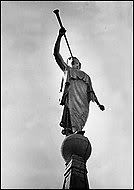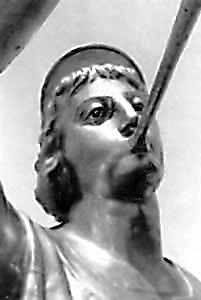JS # 4--How to Conjure Moroni
 The visitation of Moroni to the young Joseph Smith was preceeded by a fervent prayer regarding his status before the Lord. There are interesting similarities in Joseph's account of his vision of Moroni and his First Vision almost four years before.
The visitation of Moroni to the young Joseph Smith was preceeded by a fervent prayer regarding his status before the Lord. There are interesting similarities in Joseph's account of his vision of Moroni and his First Vision almost four years before.In 1820, Joseph became concerned for the welfare of his immortal soul. His mind become distressed for he became convicted of his sins. Likewise, in 1823, the repentant Joseph was seeking reconciliation with the Lord concerning his sins and follies. Our JS manual tells us that he "desired a manifestation to me, that I might know of my state and standing before him..." (p. 57)
Latter-day Saints tend to emphasize the results of these two prayers relating to the future organization of the Church. The First Vision is seen as important because the Lord told Joseph that no Church currently on the earth held the fulness of the gospel. Moroni's visit is significant because of the information the angel imparted about the Golden Plates that Joseph would later translate. But I believe that to Joseph personally, the greater significance in these manifestations was in uncovering his status before the Lord and the forgiveness of his sins.
In the third Lecture on Faith, it is taught: "Let us here observe, that three things are necessary, in order that any rational and intelligent being may exercise faith in God, unto life and salvation: First, the idea that he actually exists. Second, a correct idea of his character, perfections and attributes. Third, an actual knowledge that the course of life which he is pursuing, is according to his [God's] will."
Joseph's prayer was a desire for all three items in the aforementioned list. I'm beginning to see the importance of the third, and to realize that it is something I tend to neglect. I believe that God exists. I'm well aware of Church teachings regarding His character and attributes. But how often do I go before the Lord to know if my course is in accordance with the Divine Will? I recognize the value of seeking God's approbation regarding the big decisions--choosing a career, or whom to marry. But I'm perhaps a bit afraid of inquiring as to how I'm doing so far. As I pray for forgiveness of our sins, am I brave enough to ask for a view of how far I yet have to go?
Latter-day Saint teachings on prayer often emphasize its spontaneous nature and warn against repetitious and rote invocations. Thus we offer as a format for prayer something like the following:
Dear Heavenly Father,
We thank thee....
We ask thee....
In the name of Jesus Christ, Amen.
 We also deemphasize the Lord's Prayer as found in the scriptures, because many other churches have turned this prayer into a ritual instead of an example. This is unfortunate, really, because there are many aspects of the Lord's Prayer which are doctrinally important and not specifically mentioned in our latter-day prayer template. One of these things is the plea for forgiveness of sins which Joseph modeled in his exemplary prayers of 1820 and 1823. Joseph wanted to know of his standing before the Lord in relation to his personal righteousness. He had no idea what further revelation was in store for him. It takes a bit of courage to come to this point. But what glorious scenes may result!
We also deemphasize the Lord's Prayer as found in the scriptures, because many other churches have turned this prayer into a ritual instead of an example. This is unfortunate, really, because there are many aspects of the Lord's Prayer which are doctrinally important and not specifically mentioned in our latter-day prayer template. One of these things is the plea for forgiveness of sins which Joseph modeled in his exemplary prayers of 1820 and 1823. Joseph wanted to know of his standing before the Lord in relation to his personal righteousness. He had no idea what further revelation was in store for him. It takes a bit of courage to come to this point. But what glorious scenes may result!Labels: Joseph Smith, Mormon history, Moroni, prayer, prophet









5 Comments:
It is interesting how in the early days of the church, the focus for proselyting was on Moroni, not the first vision. Many such visions of God were common at this time. Moroni's visit, however, was completely unique. Now it seems the roles have switched. The first vision appears to be more prominent in our claims, with Moroni following after.
It is a measure of the level of my apostasy that I don't believe that God exists, but only hope. As a result, I have no idea of his character, perfections and attributes, because if he does exist, I don't know that he is anything like what I've been taught (for example, that he's a he.)
But most wicked is that as a result of some significant and important unanswered prayers, I don't really care much what God wants me to do. God doesn't care about what I want...why should I care about what he wants?
Straight to hell, I'm on my way...
sigh.
Ann - this may not help, but God does care about what you want. It is just that He knows what will bring you the most happiness in the long run, so He makes suggestions.
Take any parent of a teen about to choose a college course of study. As a parent, you know* that a degree in underwater basket weaving won't be ultimately fulfilling for your child and suggest going into something more lucrative or challenging, but you are still giving the child the choice. That choice shows love and care for the child's agency. If God didn't care what you wanted, you wouldn't have agency. (Remember Satan's plan?)
*Of course that analogy breaks down because the parent in question doesn't really know what will make their child happy. Heavenly Father does.
Ann, it took me a long time to write those two sentences. I have to say that I do believe that God exists. I've done a lot of thinking about that. It feels more right to my emotions, and it makes more sense to my brain than to say, "I don't believe there is a Divine Being." But going beyond that is tricky. I don't have enough evidence of my own to have a correct idea of his character and attributes. But I do have a good knowledge of what the Church teaches.
I want so badly to know more. I find myself trapped by the logic that says I have to have faith first in order to have a more personal, tangible experience with Deity. But it also seems that in order to move beyond what belief I already have, I would have to have more evidence. The evidence won't come until I believe; further belief won't come until I have evidence.
Anyway.
Silver Rain, I know your heart is in the right place, and I understand your position and have heard it before. But as a parent, if my child was asking me for my opinion and assistance on a college course of study, I would leave them free to choose, but I would at least give some feedback and suggestions. Complete silence from heaven at times of dire need is hard to interpret as caring. Ann, the only way I can possibly make sense of it all is to think that for some reason life is something we have to learn to do mostly by ourselves. He loves us, but can't give us much help.
Or maybe he does help us, but it is something we don't recognize as help (a la Footsteps).
Neither answer is very comforting to me during deep pain and confusion.
BiV - I understand what you mean, but my analogy was more about the "He doesn't care what I think" than about the "He's not telling me what to think" aspect of what she said.
Additionally, I would say there is never silence from heaven, only answers we are not yet willing, able, or ready to hear. For what it's worth, I'm not preaching this from the pulpit, but from the trenches - deeper in the trenches than I even knew possible.
Post a Comment
<< Home